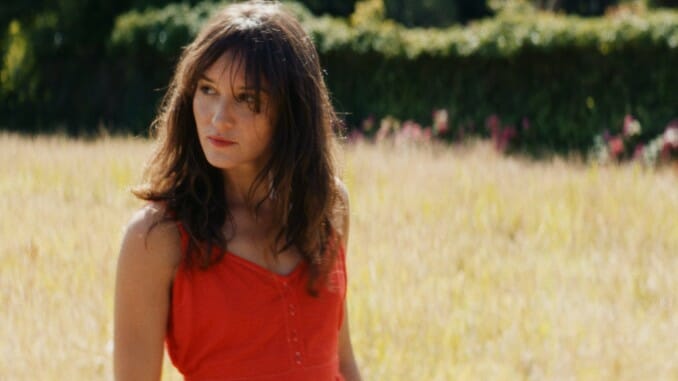
When we first meet Anaïs (Anaïs Demoustier), she’s running from a flower shop to meet her landlady at her apartment, which she now occupies alone after her split from her long-term lover Raoul (Christophe Montenez). Anaïs is always rushing around, a total whirlwind of movement and bright colors, pushing past any indication of pain. “Are you in love with your husband?” she casually asks her landlady, who is taken aback by Anaïs’ brazen nature. Anaïs is late on her rent, and late for another engagement—a house party, where she meets Daniel (Denis Podalydés), a married publisher old enough to be her father. Their affair fizzles as quickly as it begins due to Daniel’s lack of passion, according to Anaïs. However, Anaïs discovers something else in Daniel’s apartment that sparks her interest: Evidence—lipsticks, photographs, books—of his wife Émilie (Valeria Bruni-Tedeschi).
Despite Anaïs’ betrayal of this woman whom she’s never met, she feels an immediate kinship with her; she becomes a tad obsessed, chatting endlessly about Émilie’s writing to anyone who will lend her even a halfhearted ear. Ignoring all of her previous responsibilities (finishing her thesis, attending to her ailing mother), Anaïs instead chooses to follow Émilie to a remote writing symposium, away from the hustle of cosmopolitan Paris. In the erotic setting of the seaside in the heat of the summer, Anaïs and Émilie blossom into something more than your average mentor/mentee relationship. Anaïs doesn’t even miss a beat when Daniel shows up unannounced to the symposium. He’s shocked to see her; she accuses him of being overly possessive of his wife.
It’s easy to become envious of Anaïs’ confident ability to trust herself at all times. She mentions to her ex-husband that she’s pregnant and plans to get an abortion in the same offhanded way that you or I would briefly note that it might rain later. We can only assume that she got the abortion, as it’s never brought up again. Anaïs is very much someone who knows what she wants and how to get it. She knows that she doesn’t want kids so she gets the abortion, the father’s input be damned. She desires Émilie, so she pursues moments alone with her with an almost ruthless spirit. The film’s narrative structure is as aimless as its lead, and it hangs onto her every whim; few obstacles are placed in Anaïs’ way, leaving the stakes low and little room for doubt. For those who enjoy watching a protagonist effortlessly get what she wants, Anaïs in Love is a breezy ride.
First-time director Charline Bourgeois-Tacquet isn’t remotely judgmental of Anaïs’ selfishness; it’s Anaïs’ world and everyone else is just living in it, even Émilie. Although they have potent chemistry, Émilie bends to Anaïs’ will in the same way that everyone else does. Anaïs is the one who desires, never the object to be desired, which is refreshing for a film with a female protagonist. Here, Bourgeois-Tacquet explores the innate link between desire and selfishness; for Anaïs, desire is not the root of all suffering, but a way to escape suffering, even if that means blowing past other people like a tornado. By extension, Bourgeois-Tacquet questions sexist impulses to judge Anaïs as narcissistic—would we label her as such if she were a male character? Toward the end of the film, Émilie and Anaïs have a critical conversation where it became clear to me that Anaïs’ attraction to Émilie stems from the fact that Émilie is, spiritually, the older version of Anaïs herself: Charming, confident, follows her intuition no matter what. Anaïs is in love with herself, desires the best version of herself and externalizes this in her pursuit of Émilie.
Anaïs knows who she is throughout the film, and therefore never really learns anything; while her thorough rejection of any sadness or suffering is a part of who she is, it ultimately makes for a one-note film. I anticipate Anaïs in Love will often be compared to movies like Joachim Trier’s The Worst Person in the World, as they both are about 30-something brunettes with bangs running around, figuring things out. However, Anaïs only seems to pursue pleasure, where Worst Person’s Julie experiences a vast range of emotions, including doubt and sadness, in her pursuit of happiness—making for a more fully textured film.
Director: Charline Bourgeois-Tacquet
Writer: Charline Bourgeois-Tacquet
Starring: Anaïs Demoustier, Valeria Bruni Tedeschi, Denis Podalydès, Jean-Charles Clichet, Xavier Guelf, Christophe Montenez
Release Date: April 29, 2022
Brooklyn-based film writer Katarina Docalovich was raised in an independent video store and never really left. Her passions include sipping lime seltzer, trying on perfume and spending hours theorizing about Survivor. You can find her scattered thoughts as well as her writing on Twitter.